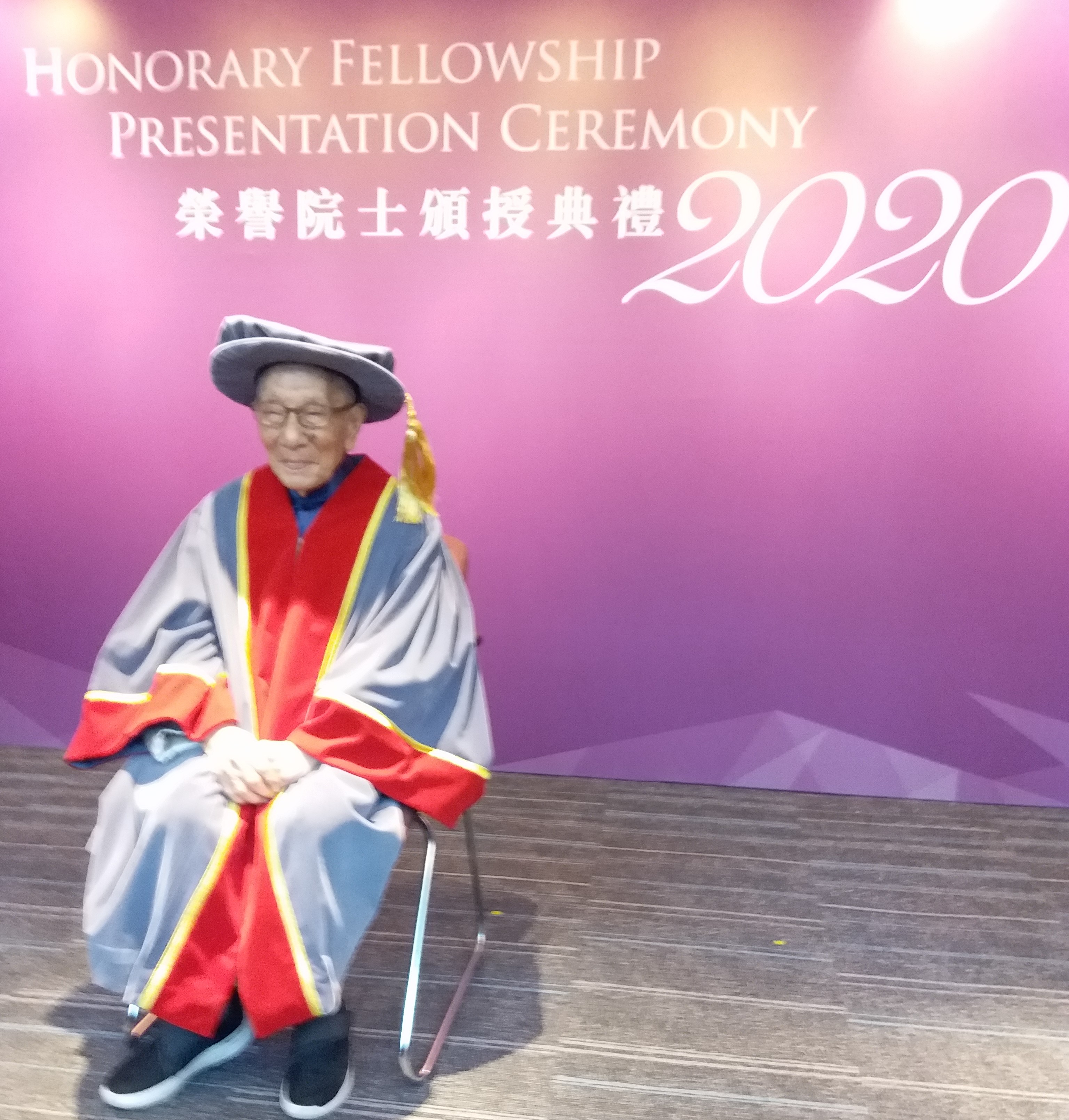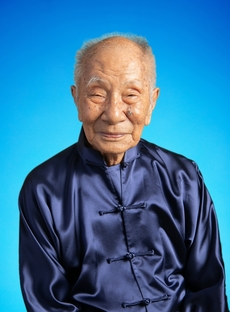Master Ip Chun is awarded an honorary academician by Lingnan University (30-10-2020)
葉準師父獲嶺南大學頒授榮譽院士銜


Master Ip Chun
葉準師父
Honorary Fellow Citation for Master Ip Chun
Born into a wealthy family in Foshan, Canton. In 1924, Mr Ip Chun was the elder son of Master Ip Man, the grandmaster of Wing Chun martial arts. His childhood was quite well-off until the age of 14, when Foshan was occupied by the Japanese and the Ip family fortune dwindled. Driven by destitution as a result of the economic malaise in his hometown, Ip Man came south to Hong Kong to make a living, leaving his son behind.
In 1962, Mr Ip came to Hong Kong at the age of 38 to be reunited with his father. Although he was the heir to the grandmaster, he himself never practiced Wing Chun in Foshan when he was young, and the thought never crossed his mind while he was doing clerical work in Hong Kong, at least not at first. However, seeing the success of his father’s disciples in raising families and buying properties through martial arts instruction, the idea of mastering the craft and passing it on began to take shape in Mr Ip’s mind. At the time he was living in his father’s school. He could hardly get to sleep in the evening when his father’s disciples came over to practice, so he stayed up to watch the class. In time, he mastered the secret art of Wing Chun. By listening to his father’s explanations, he grasped the function and execution of each move and its role in the form. With the refinement of his movements, he made rapid progress in Wing Chun. He soon became a competent teaching assistant.
Despite his exceptional talent, Mr Ip was not well-known, apart from being the son of Ip Man, until his father’s death in 1972. Bruce Lee’s death in 1973 triggered a Kung fu frenzy in Hong Kong, but even then Mr Ip only taught Wing Chun in his spare time. Some of his students found success promoting Wing Chun overseas. In the 1980s, they invited him to visit. This was the beginning of his international martial arts teaching career. Since then, he has made a few trips overseas a year to pass on the wisdom of Wing Chun and promote Chinese culture. From 2001 onwards, Mr Ip started to take Wing Chun back to China by touring and lecturing in the Mainland.
Since the turn of the century, Ip Man has been the subject of a series of martial arts films that have reinvigorated the genre. Originally the Hong Kong and Chinese film industries were not optimistic about the prospects for the film Ip Man. Yet with the increasing tension between China and Japan, the story of Ip Man defeating the Japanese excited the Mainland Chinese audience. Mr Ip went on another tour to promote the film as consultant. In the end it became a huge hit worldwide, raising awareness about Mr Ip’s many contributions.
The true spirit of martial arts is not defeating an enemy, as in the film, but in teaching humankind how to live harmony. The true spirit of martial arts is tolerance. This is why, despite Mr Ip’s background, he has never been prejudiced against other martial arts forms, a trait common in traditional martial artists. With this liberal mindset, he has never turned down any student, nor has he ever taken offence if a student chose to learn from other masters. The true spirit of martial arts is selflessness. Even though Mr Ip is pleased to teach in sports clubs, gymnasiums, universities, and his own home, he has never opened a martial arts school in his own name – quite an unusual decision.
Nevertheless, he is now celebrated worldwide for his role in upholding the proud tradition of Ip Man Wing Chun, an essential part of the Intangible Cultural Heritage of Hong Kong (Codes 3.70.3, p.65)in particular and Chinese culture in general. He has done so for over half a century and will do so until draws his dying breath. Mr Chairman, I hereby present Mr Ip Chun for the conferment of an honorary fellowship.
Citation written and delivered by Professor Lau Chi-pang
葉準師父榮譽院士贊辭
葉准先生于1924年生於廣東佛山殷實之家,其父葉問是詠春拳的一代宗師。葉先生幼年生活優悠寛裕,但年方十四卻遭逢日軍侵佔佛山的厄運,家道自此中落。日佔之下的佛山百業蕭條,葉問隻身南下香港謀生,父子兩地相隔。
1962年,葉先生以38歲之齡前來香港與父親團聚。葉先生雖然是詠春宗師哲嗣,但幼年在佛山未曾練習詠春,來港後從事文職工作,亦無習武之念。其後見父親有徒弟授拳維生,竟然可置業養家,於是萌生學拳授徒的念頭。其時葉先生居於葉問武館,晚上師徒之間交手對拆,葉先生無事可為,亦難以休息,唯有在旁觀看,日久竟掌握詠春竅門。葉先生學習詠春的歷程始於聆聽,從父親授徒的過程中領悟一招一式的力度尺寸,道理技術分別掌握妥當;結果出手分毫不差,自此學拳進步神速,迅即成為父親的得力助教。
儘管葉先生的天賦過人,但在其父1972年去世之前卻一直藉藉無聞,旁人但稱其為「葉問之子」。1973年李小龍去世,香港興起一陣功夫熱;熱潮中,葉先生亦只于工餘教授詠春拳術。八十年代,葉先生有弟子在海外發揚詠春有成,力邀師傅出洋教技,開啟了葉先生到各國開班授徒的事業。自此,葉先生每年數次到海外傳授詠春,不但指導技術,亦藉此傳播中國文化。2001年後轉往中國內地巡迴演講,將詠春帶回華夏大地推廣發揚。
千禧年後中港電影界開始以葉問作為新一代武打電影的主題,葉先生亦參與其中。最初籌拍電影《葉問》,中港業界不表樂觀。開拍之後適逢中日關係緊張,電影中葉問打敗日本人的橋段在中國內地處處受落。葉先生以顧問身份穿梭南北各地協助宣傳電影,結果電影大賣,詠春紅遍神州大地以至世界,葉先生聲名亦更上一層樓。
然而,電影所展示的暴力並非葉先生推祟的武術精神;他認為人類必須和平共處,武術亦要因應時代的進步而朝向康體方面發展。因此,儘管葉先生出自武術之家,但絕無傳統武林中人的門戶之見;他秉持有教無類的原則,來者不拒,即使徒弟另投其他門派亦不以為忤。為此葉先生自問開始授拳至今,一直穿梭體育會、體育館、大學以及其住處之間,從未以個人之名開設武館,可謂別樹一幟。
「葉問詠春」名列「香港首份非物質文化遺產清單」(編號3.70.3, p.33),是中華文化的瑰寶。葉先生畢生致力傳承詠春,永不言倦;即使年屆耄耋,仍堅持「有一口氣,點一盞燈」的精神,以超過半世紀的努力推廣詠春至中外各地,春風化雨,享譽全球,為香港傳承發揚「葉問詠春」作出重大貢獻。恭請主席先生頒授榮譽院士銜予葉准先生。
贊辭由劉智鵬教授撰寫及宣讀
DECHENG WING CHUN CULTURE CREATION (DCWCCC)